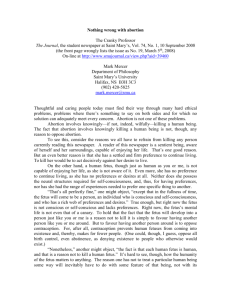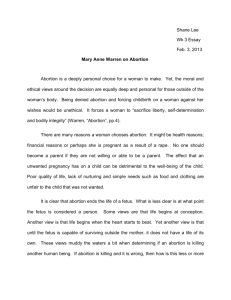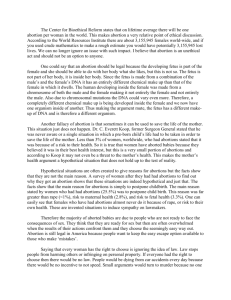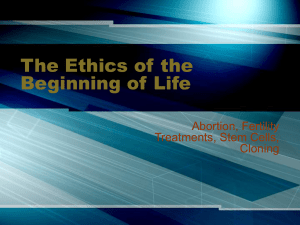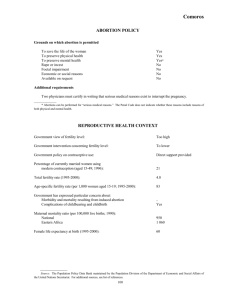CHRISTIAN ETHICS - Crossgate Church
advertisement
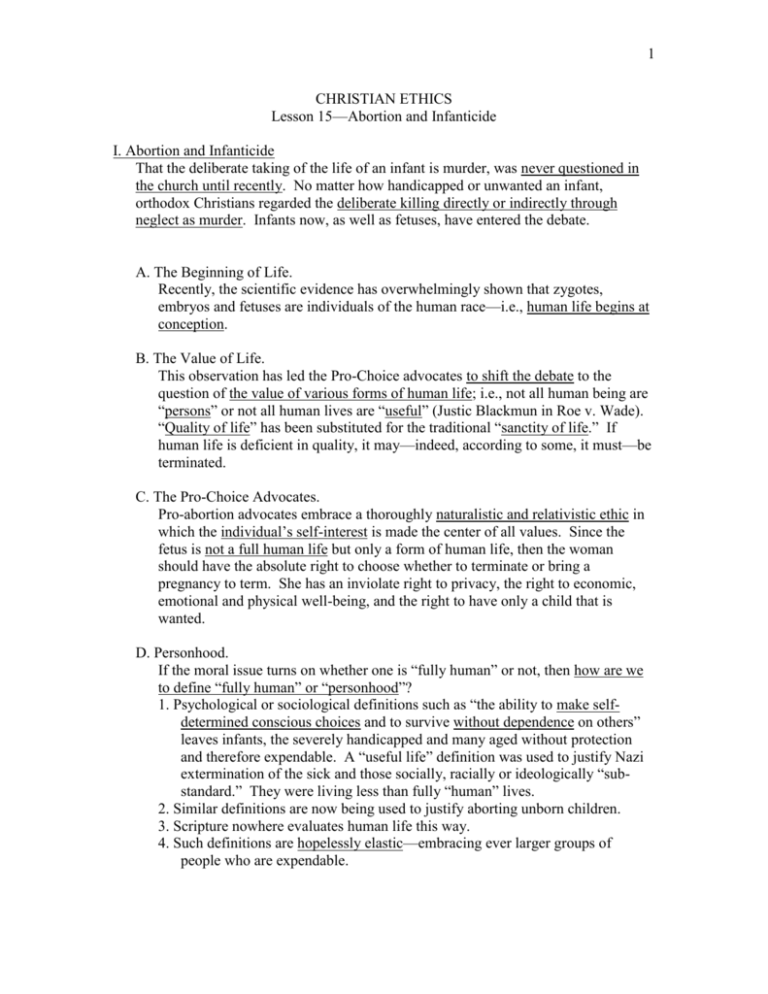
1 CHRISTIAN ETHICS Lesson 15—Abortion and Infanticide I. Abortion and Infanticide That the deliberate taking of the life of an infant is murder, was never questioned in the church until recently. No matter how handicapped or unwanted an infant, orthodox Christians regarded the deliberate killing directly or indirectly through neglect as murder. Infants now, as well as fetuses, have entered the debate. A. The Beginning of Life. Recently, the scientific evidence has overwhelmingly shown that zygotes, embryos and fetuses are individuals of the human race—i.e., human life begins at conception. B. The Value of Life. This observation has led the Pro-Choice advocates to shift the debate to the question of the value of various forms of human life; i.e., not all human being are “persons” or not all human lives are “useful” (Justic Blackmun in Roe v. Wade). “Quality of life” has been substituted for the traditional “sanctity of life.” If human life is deficient in quality, it may—indeed, according to some, it must—be terminated. C. The Pro-Choice Advocates. Pro-abortion advocates embrace a thoroughly naturalistic and relativistic ethic in which the individual’s self-interest is made the center of all values. Since the fetus is not a full human life but only a form of human life, then the woman should have the absolute right to choose whether to terminate or bring a pregnancy to term. She has an inviolate right to privacy, the right to economic, emotional and physical well-being, and the right to have only a child that is wanted. D. Personhood. If the moral issue turns on whether one is “fully human” or not, then how are we to define “fully human” or “personhood”? 1. Psychological or sociological definitions such as “the ability to make selfdetermined conscious choices and to survive without dependence on others” leaves infants, the severely handicapped and many aged without protection and therefore expendable. A “useful life” definition was used to justify Nazi extermination of the sick and those socially, racially or ideologically “substandard.” They were living less than fully “human” lives. 2. Similar definitions are now being used to justify aborting unborn children. 3. Scripture nowhere evaluates human life this way. 4. Such definitions are hopelessly elastic—embracing ever larger groups of people who are expendable. 2 5. Many have abandoned psychological and sociological definitions and turned instead to some form of biological definition. E. Biological Evidence. 1. There is no significant biological distinction between the late-term fetus and the newborn. 2. The time of fetal “viability” and even embryonic “viability” has been pushed back to the moment of conception by the advent of the artificial uterus. 3. There is no clear-cut demarcation in the development of human life from conception to adulthood. 4. Thus, Pro-Life advocates maintain that “fully human life” begins at conception and that a zygote has the right to life over all rights of the mother except that of her own right to life. As death is defined as the cessation of heart and brain activity, so life begins with such. Brain waves occur 6 weeks after conception, pain sensation is experienced also by then. Biological human functions are present by 12 weeks. 5. Biologically, there is little difference between aborting a fetus and killing an infant. 6. The burden of proof that a fetus is not human lies with the abortionist. 7. In such high-stakes uncertain issues, the benefit of the doubt certainly should be given the fetus. 8. Any “quality of life” argument should give place to the “sanctity of life” ethic. F. Biblical Evidence. 1. Scripture does not directly address the issue of abortion. But it certainly does teach principles that bear on the subject. Human life is made in the image of God (cf. Jas 2). 2. The command, “You shall not kill,” is the overarching principle that condemns the taking of innocent human life. 3. This broad command is limited only by exceptions Scripture itself enjoins, such as justifiable warfare, capital punishment and self-defense. 4. Ex 21:22-25—“When men strive together and hit a pregnant woman, so that her children come out, but there is no harm, the one who hit her shall surely be fined, as the woman’s husband shall impose on him ... But if there is harm, then you shall pay life for life, etc.” Recompense must be made for causing a miscarriage. It is unclear whether the “harm” in view is that to the mother or to the fetus. Most interpreters say it is the mother. But Luther and Calvin and many Jewish scholars today say the fetus is also included and that the “eye for an eye” punishment applied if the fetus was killed. But the interpretation is controversial. 5. Ps 139:13-16—The fetus before birth is viewed by God as a person (“You formed my inward parts; you knotted me together in my mother’s womb...etc.”). But it is possible that this is poetic hindsight from the perspective of the fully developed person that the fetus would become. 6. Luke 1:44—“... when the sound of your greeting came to my ears, the baby in my womb leaped for joy.” As a fetus of 6 months, John the Baptist leaps for 3 joy. In v. 43, Elizabeth addresses Mary as “mother of my Lord” and not as “the future mother of my potential Lord.” Also, was Jesus in Mary’s womb at this time simply a potential human being or the eternal Son of God? 7. The several instances in Scripture where God calls people while still in their mother’s wombs—i.e., they are fully human persons as fetuses. But this is offset by passages like Jer 1:5 where the same is said of a person before conception and Eph 1:4 where such is said of persons before the foundation of the world. 8. In both Hebrew and Greek, the same word is used for both fetus and child suggesting the identity of pre-natal and post-natal life (Ex 21:22, Hebrew Yeled; Acts 7:19 and Luke 1:41, 44, Greek Brephos). 9. Nothing in Scripture speaks against the humanness of the fetus and several passages seem to speak for it. Thus, just as we must presume an unconscious person to be alive until proof is certain that he is dead, so with the unborn child. Fetal life should be treated as infant life. G. Abortion As Murder. Should capital punishment be required of those guilty of aborting a fetus? 1. It is impossible to prove conclusively from Scripture that the zygote or embryo is an immortal soul. 2. Scripture does not expressly prescribe such punishment for abortion. 3. Scripture prescribes lesser penalties for other forms of taking human life (through criminal neglect or reckless behavior). 4. The abortion of a zygote or embryo is a sin of reckless violence, a possible homicide. 5. The abortion of a fetus is a crime, almost certainly a homicide deserving of severe punishment but not capital punishment. II. Response to Pro-Abortion Arguments. A. The Right to Choose. Pro-abortionists argue that each woman alone has the right to choose what is done to and in her body. But rights to self-determination are limited by the rights of others and a pregnant woman has made a prior choice to have intercourse which has brought another person into her life whose rights now limit hers. B. Economic and Social Well-Being. The most common reason for aborting a fetus is the convenience of the mother— the desire for freedom from the limitations of parenting and for an affluent lifestyle. But this is the most trivial and selfish of reasons. It is a great moral impoverishment to “decide that a child must die that you may live as you wish” (Mother Theresa). C. The Mental Health of the Mother. But can the potential psychological damage to the mother really be compared to the certain loss of the life of a child and even its possible agony of a violent, painful and protracted dying. Moreover, studies indicate a far higher incidence of psychological damage to mothers who choose abortion (e.g., threats of suicide). D. The Life of the Mother. 4 Abortion on these grounds may be justified as self-defense or the lesser of two evils. But this dilemma is very rare. E. Unwanted Children. It is claimed by some that “No one should be forced to bring an unwanted child into the world.” 1. But many unwanted children become very much wanted at birth. 2. Given the limitless desire to adopt in the USA, there really are no unwanted children. 3. The same logic applies to children who have been birthed—do we dare say “No parent should be forced to raise an unwanted child”? 4. To abort an unwanted fetus because of an unhappy future it would otherwise face, should logically require that we terminate the lives of children and adults who may face possibly unpleasant futures. 5. Abortion has not lessened cases of child-abuse as promised. In reality, childabuse has increased nearly 400% since Roe v. Wade. 6. Abortion is the ultimate child-abuse and seems to lessen the abhorrence to violence toward the already born. 7. It is hypocritical and irresponsible to claim one does not want what one has brought into existence. It is more honorable to face the consequences of one’s past choices and make the child wanted either by raising it with love or seeing it is adopted by a loving family. 8. Given that female fetuses are aborted out of all proportion to males in situations where sex determinations are made, it is ironic that women wish to support this ghastly business. It is a perverse form of genocide against women. 9. Anti-abortionists have a responsibility to provide alternatives to mothers with unwanted pregnancies (counseling, shelters, adoption options, medical and financial help). F. Rape, Incest, and the Handicapped. 1. It is difficult to justify an exception to the rule against abortion. 2. Pregnancy following rape is rare (Yugoslavia: 20,000 rapes resulted in no pregnancies; Minneapolis/St. Paul: 3,500; Congo rebellion in which nurses were repeated raped for months resulted in to pregnancies). 3. Medical treatment to prevent pregnancy is available for rape cases. 4. If a fetus is a human being, it is wrong to destroy it even in cases of rape. A second act of violence doesn’t correct the first. 5. The unborn child of rape has an inalienable right to life; he does not deserve capital punishment for his father’s crime. 6. Permitting abortion for rape or incest trivializes these crimes for they will be used as loopholes in the law to secure abortions when no rape or incest has in reality occurred. 7. Prompt reporting of rape or incest can secure contraceptive medical aid so there need be no abortion. 8. Aborting a handicapped fetus has validity only if the fetus is not a human being. If it is human, it has a right to life like the handicapped child or adult. 5 9. Physical handicap does not, except in the most extreme cases, need to mean a life not worth living. The suicide rate among the handicapped is virtually zero. 10. Parents and society can experience joy and moral freedom in caring and providing for the handicapped. G. Abortion Law. 1. If abortion is wrong, it should be made illegal. 2. Abortion is not a private matter but involves others: the unborn child, the father, and society. 3. It is foolish to say that morals cannot be legislated. Most of what is legislated involves moral beliefs; e.g., private religious convictions regarding the rightness of slavery, polygamy, discrimination against blacks, mutilation of Asians, etc., would not be tolerated by liberal defenders of private personal rights and freedoms. 4. Christians should work to get as much legal protection for innocent life that they can, even if it is not a total prohibition of abortion in all circumstances. Prohibition of first term abortions is the ideal for it is here that 90% occur. But second and third term prohibitions are certainly better than nothing. 5. The argument that to legally prohibit abortions will return us to the back-alley butchers of illegal abortionists is overblown. The number of deaths which allegedly occurred through illegal abortions has been greatly inflated. In 1971 (2 years prior to Roe v. Wade) only 68 deaths in the entire USA resulted from illegal abortions (15 million unborn baby deaths by abortion have followed since liberalization). 6 Neither a pluralist society, nor a free should allow people to follow their own consciences nor their right to privacy if this leads to the killing of an innocent human being made in the image of God. Both a just society and a merciful one may well pass laws resulting in fairness to some and burdens to others if not to do so will encourage or legalize killing innocent unborn children. A wise society will protect the sanctity of life.
